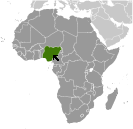World Atlas: Nigeria. On this page you can see the map, country flag and many detailed information about the people, history and economy of Nigeria.

Here you can find online selected information about the geography, inhabitants, government, economy and history of Nigeria. Included are selected statistics, an overview map and the detailed map of Nigeria. But let's start with the flag of Nigeria here:
Nigeria - Overview:
What you should know about Nigeria? Let's start with this: British influence and control over what would become Nigeria and Africa's most populous country grew through the 19th century. A series of constitutions after World War II granted Nigeria greater autonomy. After independence in 1960, politics were marked by coups and mostly military rule, until the death of a military head of state in 1998 allowed for a political transition. In 1999, a new constitution was adopted and a peaceful transition to civilian government was completed. The government continues to face the daunting task of institutionalizing democracy and reforming a petroleum-based economy, whose revenues have been squandered through corruption and mismanagement. In addition, Nigeria continues to experience longstanding ethnic and religious tensions. Although both the 2003 and 2007 presidential elections were marred by significant irregularities and violence, Nigeria is currently experiencing its longest period of civilian rule since independence. The general elections of April 2007 marked the first civilian-to-civilian transfer of power in the country's history and the elections of 2011 were generally regarded as credible. The 2015 election is considered the most well run in Nigeria since the return to civilian rule, with the umbrella opposition party, the All Progressives Congress, defeating the long-ruling People's Democratic Party that had governed since 1999.
Geography of Nigeria
 Where on the globe is Nigeria? The location of this country is Western Africa, bordering the Gulf of Guinea, between Benin and Cameroon. Total area of Nigeria is 923,768 sq km, of which 910,768 sq km is land. So this is quite a large country. How could we describe the terrain of the country? This way: southern lowlands merge into central hills and plateaus; mountains in southeast, plains in north. The lowest point of Nigeria is Atlantic Ocean 0 m, the highest point Chappal Waddi 2,419 m. And the climate is varies; equatorial in south, tropical in center, arid in north.
Where on the globe is Nigeria? The location of this country is Western Africa, bordering the Gulf of Guinea, between Benin and Cameroon. Total area of Nigeria is 923,768 sq km, of which 910,768 sq km is land. So this is quite a large country. How could we describe the terrain of the country? This way: southern lowlands merge into central hills and plateaus; mountains in southeast, plains in north. The lowest point of Nigeria is Atlantic Ocean 0 m, the highest point Chappal Waddi 2,419 m. And the climate is varies; equatorial in south, tropical in center, arid in north.
Inhabitants of Nigeria
Let's take a look how many people live in Nigeria. The number is: 190,632,261. So this country is among the most populous in the World. Who lives here? Nigeria, Africa's most populous country, is composed of more than 250 ethnic groups; the most populous and politically influential are: Hausa and the Fulani 29%, Yoruba 21%, Igbo (Ibo) 18%, Ijaw 10%, Kanuri 4%, Ibibio 3.5%, Tiv 2.5%. What are the languages in Nigeria? English (official), Hausa, Yoruba, Igbo (Ibo), Fulani, over 500 additional indigenous languages. And the religions: Muslim 50%, Christian 40%, indigenous beliefs 10%. How old are the people in average? 18.4 years. We have to add that this number is the median - so one half of the people is older than this, one half is younger. And what is their life expectancy (at birth)? This: 53.8 years. Where the people live in Nigeria? Here: largest population of any African nation; significant population clusters are scattered throughout the country, with the highest density areas being in the south and southwest. The major urban areas of Nigeria are: Lagos 13.123 million; Kano 3.587 million; Ibadan 3.16 million; Abuja (capital) 2.44 million; Port Harcourt 2.343 million; Benin City 1.496 million (2015).
Government and Economy of Nigeria
The capital of Nigeria is Abuja and the government type federal presidential republic. Let's take a look at the administrative divisions - 36 states and 1 territory; Abia, Adamawa, Akwa Ibom, Anambra, Bauchi, Bayelsa, Benue, Borno, Cross River, Delta, Ebonyi, Edo, Ekiti, Enugu, Federal Capital Territory, Gombe, Imo, Jigawa, Kaduna, Kano, Katsina, Kebbi, Kogi, Kwara, Lagos, Nasarawa, Niger, Ogun, Ondo, Osun, Oyo, Plateau, Rivers, Sokoto, Taraba, Yobe, Zamfara. Regarding the economy of Nigeria, important industrial products are crude oil, coal, tin, columbite; rubber products, wood; hides and skins, textiles, cement and other construction materials, food products, footwear, chemicals, fertilizer, printing, ceramics, steel. Important agricultural products are cocoa, peanuts, cotton, palm oil, corn, rice, sorghum, millet, cassava (manioc, tapioca), yams, rubber; cattle, sheep, goats, pigs; timber; fish. The most important export commodities are petroleum and petroleum products 95%, cocoa, rubber (2012 est.) and the most important export partners are India 34%, US 9%, Spain 5.9%, France 5.8%, South Africa 5.5%, Canada 5.1% (2016). The most important import commodities are machinery, chemicals, transport equipment, manufactured goods, food and live animals and the most important import partners are China 20.3%, US 8.3%, Belgium 7.6%, UK 4.4%, Netherlands 4.1% (2016). How rich is Nigeria and how rich are people in this country? The most important number here is GDP per capita (PPP): $5,900 (2017 est.). This is quite a low number. Let's add that this means Gross Domestic Product per person, which is recalculated with respect to the relative cost of local goods and services. And one more important number - population below poverty line: 70% (2010 est.).